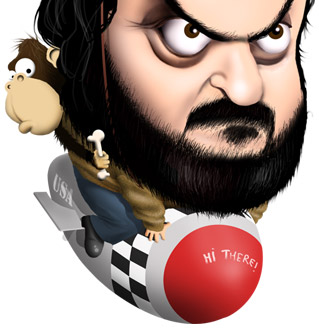
is movies are strange, cool, and immensely popular. His subject matter ranged from the end of the world to human evolution, to the folly of war, the possibility of human annihilation, and, of course, sex and ultra violence. At times, some might have attributed his popularity to a kind of arty sensationalism, but it's just possible that the enduring appeal of films by Stanley Kubrick (July 26, 1928 – March 7, 1999) is his respect for his own artistic vision and the ability of the audience to catch up with it. Frequently accused of being a "cold" auteur and often the subject of mixed reviews, his films played their emotional cards so carefully they were sometimes all but invisible; they invited but did not demand our attention. An invitation is always more compelling than a demand.
Raised in the Bronx by Jewish parents, the young Stanley Kubrick was one of those young people who is a little too smart and a little too self-directed to do well in ordinary public school. He did, however, excel in the unforgiving strategy of chess and the art and science of photography. He made money at both but got a gig with Look magazine in 1946, graduating from apprentice to full-time staff photographer. Fascinated by the melodramas of moving camera aesthete Max Ophuls ("The Earrings of Madame De," "Letter to an Unknown Woman"), he gravitated towards the movies.
Kubrick made a few documentary shorts and then, during a time when independent filmmaking was all but unheard of outside of the grindhouse circuit, he scrounged together the money to make his first short narrative feature, with him and his soon-to-be ex-wife as his only crew. Kubrick later disliked "Fear and Desire" and actively suppressed it. A perfectly shot and painfully slow film noir about a boxer, "Killer's Kiss," followed in 1955. Kubrick finally got it right the third time with a bigger budget, thanks to the help of producer James B. Harris and legendary pulp novelist/screenwriter Jim Thompson. "The Killing" was an oddly stylized and blackly humorous heist tale told from multiple perspectives and with multiple time frames. It proved hugely influential on crime films for decades after, most obviously on Quentin Tarantino's 1992 debut, "Reservoir Dogs."
Next was "Paths of Glory," a grim, righteously infuriating film about injustice and the folly of war which starred superstar Kirk Douglas as a French colonel trying to prevent the politically motivated executions of three hapless soldiers. It wasn't a hit, but most observers saw that Kubrick had a gift for making strangely compelling drama. Impressed, Douglas had Kubrick hired to replace the great action director Anthony Mann on the politically charged sword & sandals epic, "Spartacus." The actor-producer had been feuding with Mann and he was reportedly hoping that, on his first truly large production, Kubrick would be more malleable than a veteran like Mann. Douglas was very wrong and more star-director tussling ensued. "Spartacus" was nevertheless successfully completed and became a highly entertaining hit, largely thanks to the work of blacklisted writer Dalton Trumbo. Kubrick could not claim that much authorship and, later on, was openly disdainful of the production.
Having also fought Marlon Brando over the western "One-Eyed Jacks," which Brando eventually directed himself, Kubrick was desperate for greater creative control and permanently decamped for England. The move worked. Kubrick's next film, "Lolita," even more than "The Killing," established the director's sardonic style. Considering that the very restrictive movie production code was still in effect and the hugely controversial novel by Vladimir Nabokov dealt with a man sexually enraptured by a scheming 12-year-old "nymphet," the tag-line "How did they make a movie of Lolita?" was more than appropriate. In fact, Kubrick struggled to get the film made. To try and take some of the edge off the controversy, Kubrick made Lolita 14, casting the relatively mature looking Sue Lyons in the part. With stars James Mason, Peter Sellers, and Shelley Winters on board, the film rode its notoriety and entertainment value to a broad success despite its daunting literary pedigree, transgressive subject matter, and a two-and-a-half hour running time.
 With the Cold War at its height, the threat of nuclear annihilation was at its hottest and Kubrick's follow-up was in some ways even bolder. Starting with a serious novel about an accidental nuclear war called Red Alert, Kubrick decided to go a very different route than Sidney Lumet's similarly themed and timed "Fail Safe." He brought in writer Terry Southern to help turn the thriller into the strongest political satire ever put on film, 1964's "Dr. Strangelove or: How I Learned to Stop Worrying and Love the Bomb" featuring Peter Sellers in three distinct roles, including the rabid ex-Nazi title character with an uncontrollable right arm ready for Sieg Heiling. Satires aren't supposed to make money, but aside from the acclaim and controversy, "Dr. Strangelove" actually did. It's also widely considered one of the greatest film comedies of all time.
With the Cold War at its height, the threat of nuclear annihilation was at its hottest and Kubrick's follow-up was in some ways even bolder. Starting with a serious novel about an accidental nuclear war called Red Alert, Kubrick decided to go a very different route than Sidney Lumet's similarly themed and timed "Fail Safe." He brought in writer Terry Southern to help turn the thriller into the strongest political satire ever put on film, 1964's "Dr. Strangelove or: How I Learned to Stop Worrying and Love the Bomb" featuring Peter Sellers in three distinct roles, including the rabid ex-Nazi title character with an uncontrollable right arm ready for Sieg Heiling. Satires aren't supposed to make money, but aside from the acclaim and controversy, "Dr. Strangelove" actually did. It's also widely considered one of the greatest film comedies of all time.
Kubrick doubled down in about the boldest way possible and made arguably the greatest science fiction film of all time. Co-written with science fiction great Arthur C. Clarke, "2001: A Space Odyssey" was five years in the making and, with minimal dialogue throughout most of its length, basically amounted to a three hour long, $10 million dollar, experimental art flick. Readers of the companion novel written by Clarke were aware of the more traditional science fiction tale underlying the film's enigmatic approach, but many critics and most audience members were utterly baffled and often a bit bored, though dazzled by the photography and Douglas Trumbull's unprecedented space travel effects. Kubrick, however, got the commercial boost he needed from the emerging drug culture. MGM's ad writers noted that young people were seeing "2001" bolstered by various herbal, vegetable, and chemical aids and came up with the ad slogan, "the ultimate trip." The film played literally for years in urban venues like Los Angeles's Cinerama Dome.
His perfectionism bolstered by success, each Kubrick film that followed took longer to complete than the last, but Kubrick's batting average with audiences, critics, and awards groups remained enormous. "A Clockwork Orange" literally defined ultra violence and was one of only two films to receive both an X rating and a Best Picture Oscar nomination. (It was also effectively banned in England for many years due to a series of alleged copycat crimes.) "The Shining" displeased author Stephen King but became one of the most noted horror films of the 1980s. "Full Metal Jacket" crafted the ultimate boot camp horror show in its cynical but arguably apolitical depiction of the Vietnam War.
In all, Kubrick only made two major films that truly failed with audiences. The eye-filling 1975 period comedy-drama, "Barry Lyndon" starring Ryan O'Neal, and his final, posthumously released "Eyes Wide Shut" starring the ex-power couple of Nicole Kidman and Tom Cruise. Another project, "A.I. Artificial Intelligence" was eventually completed by Steven Spielberg to not much more success but, by that point, the late director's status as one of the great directors of all time was unshakeable.
Though Stanley Kubrick was often labeled as a director uncomfortable with human feeling – and some of his films seem to justify that view in various ways – a truly unemotional director would not have been as successful with audiences, nor would he be as enduring and influential. Kubrick crafted some of the most beautiful and emotionally powerful films ever made, precisely by not begging his audience to love his characters, or his films. If he sometimes went too far in deliberately alienating us, it was perhaps because those emotionally still waters ran terribly deep. Not that Kubrick's motivations matter. It's the movies that count and, at their very best, they rank among the most beautiful and compelling films from any filmmaker.

"Paths of Glory"
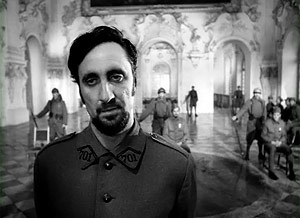 If, like some of us, you get a sort of perverse enjoyment from being righteously angry, this is your film. As the courageous World War I French military man and lawyer who defends three of his men slated for a firing squad to provide cover for a deadly military snafu, Kirk Douglas makes a memorable leading man. Our focus, however, is just as much on the victims of the injustice (Wayne Morris, Ralph Meeker, and Timothy Carey) and the smug and utterly self righteous general (perennial character actor Adolph Menjou) who orders his men on a suicide mission for his own self-aggrandizement and then decides to execute the survivors for the crime of not dying. Douglas fought hard to maintain Kubrick's brutally uncompromising ethical vision. The film, and Douglas's creative instincts as a producer, were spot on.
If, like some of us, you get a sort of perverse enjoyment from being righteously angry, this is your film. As the courageous World War I French military man and lawyer who defends three of his men slated for a firing squad to provide cover for a deadly military snafu, Kirk Douglas makes a memorable leading man. Our focus, however, is just as much on the victims of the injustice (Wayne Morris, Ralph Meeker, and Timothy Carey) and the smug and utterly self righteous general (perennial character actor Adolph Menjou) who orders his men on a suicide mission for his own self-aggrandizement and then decides to execute the survivors for the crime of not dying. Douglas fought hard to maintain Kubrick's brutally uncompromising ethical vision. The film, and Douglas's creative instincts as a producer, were spot on.
"Dr. Strangelove or: How I Learned to Stop Worrying and Love the Bomb"
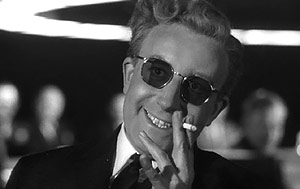 If you're old enough to remember what it felt like to live under the actual threat of total nuclear death, then you might also have some idea of just what a relief it was to laugh at it. Audiences traumatized by decades of jingoistic "better dead than red" rhetoric, the Cuban Missile Crisis, and the emerging reality of the horrors of the World War II bombings of Hiroshima and Nagasaki certainly responded to this film which essentially portrays our leaders – generals, strategists, ambassadors, and presidents of all sides – as being motivated by silly and selfish whims, especially including sex. Even the decent and humane President Merkin Muffley (Peter Sellers doing a subtly hilarious variation on two-time Democratic presidential nominee Adlai Stevenson) is far from up to the enormity of the situation. With the amazing production design of Ken Adam, whose "war room" was so vivid that President Ronald Reagan was famously disappointed to find that the real White House didn't have one, this is a film that cannily builds up suspense before it unleashes its nuclear hilarity.
If you're old enough to remember what it felt like to live under the actual threat of total nuclear death, then you might also have some idea of just what a relief it was to laugh at it. Audiences traumatized by decades of jingoistic "better dead than red" rhetoric, the Cuban Missile Crisis, and the emerging reality of the horrors of the World War II bombings of Hiroshima and Nagasaki certainly responded to this film which essentially portrays our leaders – generals, strategists, ambassadors, and presidents of all sides – as being motivated by silly and selfish whims, especially including sex. Even the decent and humane President Merkin Muffley (Peter Sellers doing a subtly hilarious variation on two-time Democratic presidential nominee Adlai Stevenson) is far from up to the enormity of the situation. With the amazing production design of Ken Adam, whose "war room" was so vivid that President Ronald Reagan was famously disappointed to find that the real White House didn't have one, this is a film that cannily builds up suspense before it unleashes its nuclear hilarity.
"2001: A Space Odyssey"
 Trust us, if you've never seen this in a movie theater, you haven't really seen it. And if you've never seen it in 70mm in the absolute biggest screen you can find, you haven't exactly seen it. Apart from the section dealing with the attempt of the suddenly self-aware HAL 9000 to save his own "life" by doing away with the crew of Discovery 1, "2001" is not a drama that draws you in. It is a work that enters the consciousness less in the manner of traditional drama and more in the manner of a work of art or serious music. From the lyrical "Blue Danube" sequence in which Dr. Heywood Floyd (William Sylvester) enjoys the pleasures of commercial space travel – and why haven't we got that yet? – to the mind-boggling and beautiful conclusion, this is a film that isn't really about the usual movie emotions. Nor is it precisely an intellectual experience; it's a kind of spiritual experience and also, of course, an amazing spectacle with visuals and effects that stand up beautifully four decades later. It might have been the "ultimate trip" but chemical help is not required. All you really need is an open mind. (Coffee or Red Bull might not be a bad idea, however.)
Trust us, if you've never seen this in a movie theater, you haven't really seen it. And if you've never seen it in 70mm in the absolute biggest screen you can find, you haven't exactly seen it. Apart from the section dealing with the attempt of the suddenly self-aware HAL 9000 to save his own "life" by doing away with the crew of Discovery 1, "2001" is not a drama that draws you in. It is a work that enters the consciousness less in the manner of traditional drama and more in the manner of a work of art or serious music. From the lyrical "Blue Danube" sequence in which Dr. Heywood Floyd (William Sylvester) enjoys the pleasures of commercial space travel – and why haven't we got that yet? – to the mind-boggling and beautiful conclusion, this is a film that isn't really about the usual movie emotions. Nor is it precisely an intellectual experience; it's a kind of spiritual experience and also, of course, an amazing spectacle with visuals and effects that stand up beautifully four decades later. It might have been the "ultimate trip" but chemical help is not required. All you really need is an open mind. (Coffee or Red Bull might not be a bad idea, however.)

"Lolita"
 One of the biggest disappointments of this writer's reading life was finally getting around to reading Vladimir Nabokov's novel, Lolita, after countless viewings of the 1962 film, only to realize it was not going to be particularly hilarious. Forced to soft-peddle the sexuality, Kubrick rewrote Nabokov's screenplay into a film that is both a tragedy and an extremely funny black comedy. Certainly the film's key confrontations between James Mason, one of the greatest film stars of the classic era, and amazing relative newcomer Peter Sellers as the venal TV playwright and competitor for the affection of Lolita, Claire Quilty, are some of the most electrifying ever put on film. The skin-crawling work of Shelley Winters as the priggish snob, Charlotte Haze, and the appropriately flat but sympathetic performance of 14-year-old Sue Lyons as her not-so-beloved daughter, Delores "Lolita" Haze, are equally on target as Kubrick's unblinking camera milks every ounce of haunting tragedy and absurd comedy from the proceedings. At two-and-a-half hours, "Lolita" feels somewhat long, but it's a film we keep coming back to.
One of the biggest disappointments of this writer's reading life was finally getting around to reading Vladimir Nabokov's novel, Lolita, after countless viewings of the 1962 film, only to realize it was not going to be particularly hilarious. Forced to soft-peddle the sexuality, Kubrick rewrote Nabokov's screenplay into a film that is both a tragedy and an extremely funny black comedy. Certainly the film's key confrontations between James Mason, one of the greatest film stars of the classic era, and amazing relative newcomer Peter Sellers as the venal TV playwright and competitor for the affection of Lolita, Claire Quilty, are some of the most electrifying ever put on film. The skin-crawling work of Shelley Winters as the priggish snob, Charlotte Haze, and the appropriately flat but sympathetic performance of 14-year-old Sue Lyons as her not-so-beloved daughter, Delores "Lolita" Haze, are equally on target as Kubrick's unblinking camera milks every ounce of haunting tragedy and absurd comedy from the proceedings. At two-and-a-half hours, "Lolita" feels somewhat long, but it's a film we keep coming back to.

"Eyes Wide Shut"
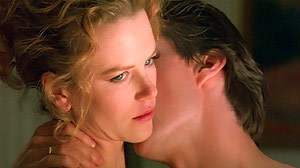 Kubrick probably never made an entirely worthless film but in terms of one unfathomable creative decision after another, this entirely misconceived dream-like tale of sexual jealousy among characters that don't seem particularly human really takes the cake. "Eyes Wide Shut" consumed years of the time of not only stars Tom Cruise and Nicole Kidman, but Harvey Keitel, who left and was then replaced by the late Sidney Pollack, who put in some serious time of his own. (The late actor-director's performance in a lengthy "Irving, the explainer" role turns out to be the most involving part of the movie.) Though the film can be maddening – the repeated musical motif by experimental composer Jocelyn Pook of a single piano key being hit again and again and again comes to mind – its commitment to its many bad ideas is truly impressive. The much discussed ultra-creepy orgy scene may be dull and anti-erotic enough to give sex a bad name but, at the same time, it's certainly vivid. You very might well hate this posthumously released film, but you won't forget it. Kubrick never went half way, and that was part of his greatness.
Kubrick probably never made an entirely worthless film but in terms of one unfathomable creative decision after another, this entirely misconceived dream-like tale of sexual jealousy among characters that don't seem particularly human really takes the cake. "Eyes Wide Shut" consumed years of the time of not only stars Tom Cruise and Nicole Kidman, but Harvey Keitel, who left and was then replaced by the late Sidney Pollack, who put in some serious time of his own. (The late actor-director's performance in a lengthy "Irving, the explainer" role turns out to be the most involving part of the movie.) Though the film can be maddening – the repeated musical motif by experimental composer Jocelyn Pook of a single piano key being hit again and again and again comes to mind – its commitment to its many bad ideas is truly impressive. The much discussed ultra-creepy orgy scene may be dull and anti-erotic enough to give sex a bad name but, at the same time, it's certainly vivid. You very might well hate this posthumously released film, but you won't forget it. Kubrick never went half way, and that was part of his greatness.

"Day of the Fight" (1951) "Fear and Desire" (1953) "The Seafarers" (1953) "Killer's Kiss" (1955) "The Killing" (1956) "Paths of Glory" (1957) "Spartacus" (1960) "Lolita" (1962) "Dr. Strangelove or: How I Learned to Stop Worrying and Love the Bomb" (1964) "2001: A Space Odyssey" (1968) "A Clockwork Orange" (1971) "Barry Lyndon" (1975) "The Shining" (1980) "Full Metal Jacket" (1987) "Eyes Wide Shut" (1999) |
2001: A SPACE ODYSSEY
HAL: I'm afraid. I'm afraid, Dave. Dave, my mind is going. I can feel it. I can feel it. My mind is going. There is no question about it. I can feel it. I can feel it. I can feel it. I'm afraid. Good afternoon, gentlemen. I am a HAL 9000 computer. I became operational at the H.A.L. plant in Urbana, Illinois on the 12th of January 1992. My instructor was Mr. Langley, and he taught me to sing a song. If you'd like to hear it I can sing it for you.
Dave Bowman: Yes, I'd like to hear it, HAL. Sing it for me.
HAL: It's called "Daisy."
[sings while slowing down]
HAL: "Daisy, Daisy, give me your answer do. I'm half crazy all for the love of you. It won't be a stylish marriage, I can't afford a carriage. But you'll look sweet upon the seat of a bicycle built for two."
FULL METAL JACKET
"If you ladies leave my island, if you survive recruit training, you will be a weapon. You will be a minister of death praying for war. But until that day you are pukes. You are the lowest form of life on Earth. You are not even human, fucking beings. You are nothing but unorganized grabastic pieces of amphibian shit. Because I am hard you will not like me. But the more you hate me the more you will learn. I am hard but I am fair. There is no racial bigotry here. I do not look down on niggers, kikes, wops or greasers. Here you are all equally worthless. And my orders are to weed out all non-hackers who do not pack the gear to serve in my beloved Corps. Do you maggots understand that?"
DR. STRANGELOVE
"Gentlemen, you can't fight in here! This is the War Room."
LOLITA
Charlotte Haze: Hum, you just touch me and I... I... I go as limp as a noodle. It scares me.
Humbert Humbert: Yes, I know the feeling. – Lolita
A CLOCKWORK ORANGE
"There was me, that is Alex, and my three droogs, that is Pete, Georgie, and Dim, and we sat in the Korova Milkbar trying to make up our rassoodocks what to do with the evening. The Korova milkbar sold milk-plus, milk plus vellocet or synthemesc or drencrom, which is what we were drinking. This would sharpen you up and make you ready for a bit of the old ultra-violence."
THE SHINING
"All work and no play makes Jack a dull boy."

![]() I don't like doing interviews. There is always the problem of being misquoted or, what's even worse, of being quoted exactly.
I don't like doing interviews. There is always the problem of being misquoted or, what's even worse, of being quoted exactly.![]() (Kubrick on 'Barry Lyndon' -- Interview with Michael Ciment)
(Kubrick on 'Barry Lyndon' -- Interview with Michael Ciment)
![]() A film is – or should be – more like music than like fiction. It should be a progression of moods and feelings. The theme, what's behind the emotion, the meaning, all that comes later.
A film is – or should be – more like music than like fiction. It should be a progression of moods and feelings. The theme, what's behind the emotion, the meaning, all that comes later.![]()
![]() Anyone who has ever been privileged to direct a film also knows that, although it can be like trying to write War and Peace in a bumper car in an amusement park...
Anyone who has ever been privileged to direct a film also knows that, although it can be like trying to write War and Peace in a bumper car in an amusement park...![]()
![]() There's something in the human personality which resents things that are clear, and conversely, something which is attracted to puzzles, enigmas, and allegories.
There's something in the human personality which resents things that are clear, and conversely, something which is attracted to puzzles, enigmas, and allegories.![]()
![]() The most terrifying fact about the universe is not that it is hostile but that it is indifferent; but if we can come to terms with this indifference and accept the challenges of life within the boundaries of death — however mutable man may be able to make them — our existence as a species can have genuine meaning and fulfillment. However vast the darkness, we must supply our own light.
The most terrifying fact about the universe is not that it is hostile but that it is indifferent; but if we can come to terms with this indifference and accept the challenges of life within the boundaries of death — however mutable man may be able to make them — our existence as a species can have genuine meaning and fulfillment. However vast the darkness, we must supply our own light.![]() (Playboy Interview, September 1968)
(Playboy Interview, September 1968)
![]() If it can be written or thought, it can be filmed.
If it can be written or thought, it can be filmed.![]()

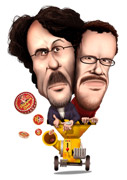 Joel & Ethan Coen Joel & Ethan Coen |
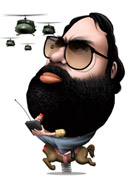 Francis Ford Coppola Francis Ford Coppola |
 Stanley Kubrick Stanley Kubrick |
 John Landis John Landis |
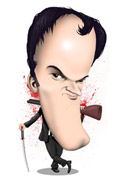 Quentin Tarantino Quentin Tarantino |
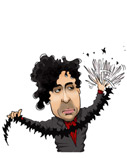 Tim Burton Tim Burton |
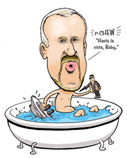 James Cameron James Cameron |
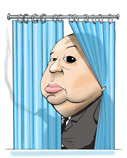 Alfred Hitchcock Alfred Hitchcock |
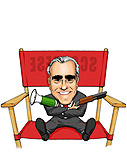 Martin Scorsese Martin Scorsese |
 Steven Spielberg Steven Spielberg |
You can follow us on Twitter and Facebook for content updates. Also, sign up for our email list for weekly updates and check us out on Google+ as well.


